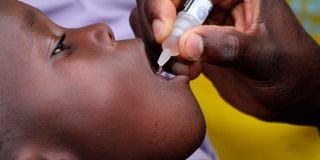Premium
Polio immunisation campaign: Concern about low uptake of vaccines in Trans Nzoia

A health officer administers polio vaccines to a five-year-old child in Nairobi.
What you need to know:
- The situation has prompted stakeholders in the health sector, including USAID Ampath, to embark on supplementary immunisation targeting those left out of the first phase, which has a 76 percent success rate.
Health officials are concerned about the low uptake of vaccines among children under five in Trans Nzoia County, with some reportedly not having been vaccinated since birth.
As a result, stakeholders are strategising a more aggressive implementation plan to meet immunisation targets.
Trans Nzoia is one of nine counties targeted in the national polio immunisation campaign amid an outbreak of the disease.
However, stakeholders say parents have been reluctant to take their children for vaccination in the first phase of the campaign, and health officials have revealed that many children have not yet been immunised due to a lack of information.
County Health Promotion Coordinator Leah Okumu said some parents had refused to vaccinate their children due to ignorance and misinformation about the safety of the vaccinations, especially the polio vaccine.
She said some parents were deeply rooted in religion and tradition and had prevented the vaccination team from administering the vaccine to their children.
“The families were hesitant and insisted that their religion does not allow vaccination. It took us a long time to persuade the affected families to allow their children to be vaccinated,” Ms Okumu told a forum on the issue in Kitale town.
The situation has prompted stakeholders in the health sector, including USAID Ampath, to embark on supplementary immunisation targeting those left out of the first phase, which has a 76 percent success rate.
Speaking at a two-day media sensitisation forum in Kitale, Ms Okumu said the Ministry of Health was engaging stakeholders in advocacy and mobilisation to increase the visibility of the programme at the grassroots.
“We want to ensure people at the grassroots have access to accurate information on health issues. This will help sensitise the population on misconceptions about immunisation,” she stated.
She argued that there is a misconception about the safety of the polio vaccine and urged the media to be at the forefront of advocacy campaigns.
“The vaccine is 100 percent safe, but there is a misconception that it has health side effects. We are appealing to the media to help us sensitize society,” said Ms Okumu.
She called for a collective approach to help the county achieve the target of 99 percent vaccination coverage.
Results from the first phase of polio immunisation show that the team reached 320,190 children aged 0-11 months out of a target of 336,047.
For children aged 0-59 months, the team reached 150,881 children out of a target of 184,412, and for children aged 60-119 months, 135,778 children were vaccinated out of a target of 185,166, or 73 percent coverage.
The report on the first phase of the campaign also shows that the county reported zero doses, which indicates that there is a population of children who have never been vaccinated.
“Zero dose is a child more than two weeks old and has not received any vaccine. This is dangerous and we are working through supplementary immunisation activities to reach these children,” said a health promotion officer.
Health stakeholders have called for increased efforts to educate parents about the benefits and safety of the vaccines, especially those who seek non-medical exemptions from school vaccination requirements.
The county's head of disease surveillance, Brian Ateka, said that 23 learners of Sudanese nationality at Gibea School had not received the vaccine after their parents refused to let them receive it.
“We had cases of refusals, which are a concern to us, especially at Gibea Schools where parents of Sudanese origin did not allow us to administer the vaccine to their children. We are engaging with them to ensure the children get the vaccine,” said Mr Ateka.
The county government launched the comprehensive polio immunisation campaign on October 2 to address the threat posed by the recent outbreak of the circulating vaccine-derived poliovirus type 2 (cVDPV2) in Kenya.
Speaking at the launch, Governor George Natembeya emphasised the urgency of the situation and called on all residents to support the campaign.
"Polio is a very dangerous disease that can cause irreversible paralysis, especially in children. We must work together to protect our children and prevent the spread of this virus," he said.
The Ministry of Health is conducting the immunisation campaign in collaboration with the World Health Organization (WHO), the Centre for Disease Control and Prevention (CDC), UNICEF, GAVI and the Bill & Melinda Gates Foundation.





